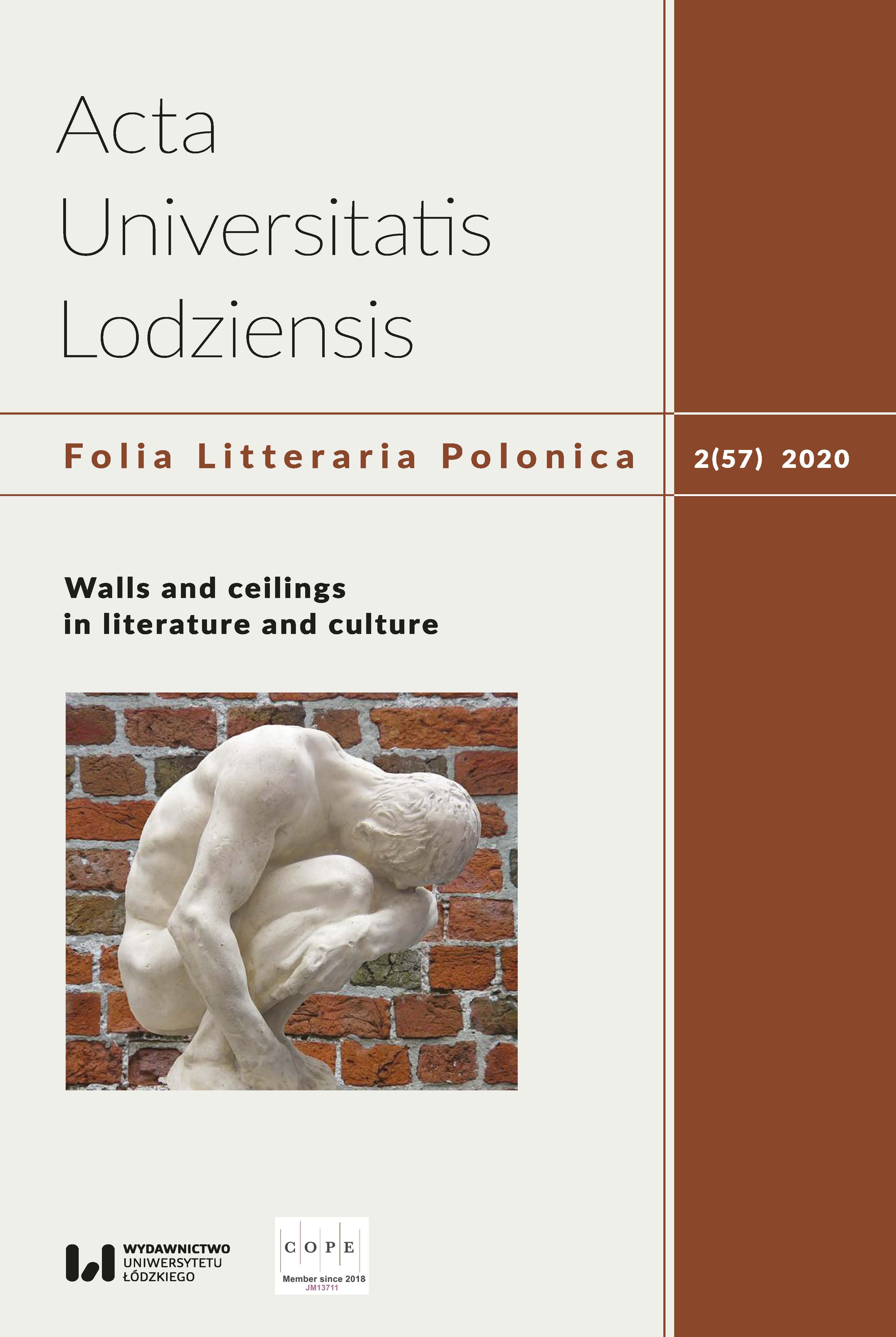The brickwork, walls and ceilings of Havana: Representations of space in Pedro Juan Gutiérrez’s Novel “Nothing to Do”
DOI:
https://doi.org/10.18778/1505-9057.57.03Keywords:
space, literature, vagabond, landscape of scents, oppression, Havana, GutiérrezAbstract
Latin America is a continent where for centuries various walls of ethnic, class, and political divisions were erected and demolished. Cubans, for whom the once paradise island became a cage, are a society which painfully experienced what those walls are as well as what isolation is. The aim of the article was to discuss the way in which Pedro Juan Gutiérrez, a writer who belongs to the first generation of Cubans who grew up in the Revolutionary reality, creates the literary space of Havana by depicting the everyday lives of its inhabitants. In the novel titled Nothing to Do [Nada que hacer] (1998), the invisible yet terribly tangible walls dividing Havana into zones of influence of various social groups, and the disintegrating walls and ceilings of flats are not the only proof of the universal poverty – they also seem to constitute a metaphor of the relations of power within the society and of the condition of its spirit. Furthermore, the author indicates how a conscious individual tries to build around themselves an intellectual wall which could separate them from the void which deprives one of the will to act. The analysis was based on the concept of mobility by Zygmunt Bauman and John Urry, on a study by Elżbieta Rybicka regarding the sensory literary geography, and on a discussion by Javier del Prado Biezma of the methods for presenting space in literature.
Downloads
References
Baldwin Elaine, Longhurst Brian, McCracken Scott, Ogborn Miles, Smith Greg, Wstęp do kulturoznawstwa, trans. Maciej Kaczyński, Jerzy Łoziński, Tomasz Rosiński, Zysk i S-ka Wydawnictwo, Poznań 2004.
Google Scholar
Bauman Zygmunt, “Bycie ubogim w społeczeństwie konsumpcyjnym”, [in:] Bauman o popkulturze. Wypisy, Mateusz Halawa, Paulina Wróbel (eds.), Wydawnictwa Akademickie i Profesjonalne, Warsaw 2008, pp. 294–297.
Google Scholar
Bauman Zygmunt, Dwa szkice o moralności ponowoczesnej, Instytut Kultury, Warsaw 1994.
Google Scholar
Bauman Zygmunt, Etyka ponowoczesna, trans. Janina Bauman, Joanna Tokarska-Bakir, Wydawnictwo Naukowe PWN, Warsaw 1996.
Google Scholar
Bauman Zygmunt, “Mobilni i niemobilni w społeczeństwie konsumpcyjnym”, [in:] Bauman o popkulturze. Wypisy, Mateusz Halawa, Paulina Wróbel (eds.), Wydawnictwa Akademickie i Profesjonalne, Warsaw 2008, pp. 288–293.
Google Scholar
Bauman Zygmunt, Płynne życie, trans. Tomasz Kunz, Wydawnictwo Literackie, Kraków 2007.
Google Scholar
Bauman Zygmunt, Ponowoczesność jako źródło cierpień, Wydawnictwo Sic!, Warsaw 2000.
Google Scholar
Birkenmaier Anke, “El realismo sucio en América Latina. Reflexiones a partir de Pedro Juan Gutiérrez”, Miradas. Revista del audiovisual 2004, issue 6, http://www.pedrojuangutierrez.com/ensayos_ensayos_anke%20birkenmaier.htm (accessed on: 27.02.2019).
Google Scholar
Cabrera Infante Guillermo, “Infamia dla wymarłej Hawany”, [in:] Guillermo Cabrera Infante, Mea Kuba, trans. Marcin Małkowski, Philip Wilson, Warsaw 2004, pp. 95–101.
Google Scholar
Carpentier Alejo, “Miasto kolumn”, [in:] Alejo Carpentier, Przedtakty i wariacje, trans. Joanna Petry Mroczkowska, Wydawnictwo Literackie, Kraków 1982, pp. 64–79.
Google Scholar
Certeau Michel de, Wynaleźć codzienność, trans. Katarzyna Thiel-Jańczuk, Wydawnictwo Uniwersytetu Jagiellońskiego, Kraków 2008.
Google Scholar
Fernández Pérez Michel, “La igualdad como fundamento y propósito de la justicia social y del desarrollo en Cuba”, Cuba posible, 25.10.2017, https://cubaposible.com/igualdad-justicia-social-del-desarrollo-cuba/ (accessed on: 19.12.2018).
Google Scholar
Fuentes Carlos, La gran novela latinoamericana, Alfaguara, Madrid 2011.
Google Scholar
Fuentes Carlos, “La nueva novela hispanoamericana (selección)”, [in:] Los novelistas como críticos, Norma Klahn, Wilfrido H. Corral (eds.), Tierra Firme, México 1991, pp. 76–94.
Google Scholar
Guillén Nicolás, Obra poética 2 t., Ed. Letras Cubanas, La Habana 1995.
Google Scholar
Gutiérrez Pedro Juan, Brudna Trylogia o Hawanie, trans. Piotr Fornelski, Zysk i S-ka Wydawnictwo, Poznań 2004.
Google Scholar
Hemingway Ernest, Mieć i nie mieć, trans. Krystyna Tarnowska, Czytelnik, Warsaw 1968.
Google Scholar
Masoliver Ródenas José Antonio, “Oficio: revolcador de mierda”, Revista de Libros, 1.08.1999, https://www.revistadelibros.com/articulos/trilogia-sucia-de-la-haba-na-de-pedro-juan-gutierrez (accessed on: 18.12.2018).
Google Scholar
Mesa-Lago Carmelo, “Problemas sociales y económicos en Cuba durante la crisis y la recuperación”, Revista de la CEPAL 2005, issue 86, pp. 183–205.
Google Scholar
DOI: https://doi.org/10.18356/fb5f4753-es
Portela Ena Lucía, “Con hambre y sin dinero”, Crítica 2003, issue 98, pp. 61–80.
Google Scholar
Prado Biezma Javier del, Análisis e interpretación de la novela. Cinco modos de leer un texto narrativo, Editorial Síntesis, Madrid 2000.
Google Scholar
Rybicka Elżbieta, Geopoetyka. Przestrzeń i miejsce we współczesnych teoriach i praktykach literackich, Universitas, Kraków 2014.
Google Scholar
Urry John, Socjologia mobilności, trans. Janusz Stawiński, Wydawnictwo Naukowe PWN, Warsaw 2009.
Google Scholar
Whitfield Esther, “Autobiografía sucia: The Body Impolitic of Trilogía sucia de La Habana”, Revista de Estudios Hispánicos 2002, issue 36.2, pp. 329–353.
Google Scholar
Downloads
Published
How to Cite
Issue
Section
License
Copyright (c) 2020 Wydawnictwo Uniwersytetu Łódzkiego

This work is licensed under a Creative Commons Attribution-NonCommercial-NoDerivatives 4.0 International License.











